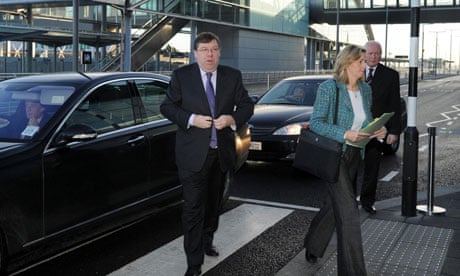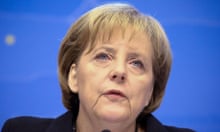The taoiseach, Brian Cowen, faced calls to resign today as talks began with the International Monetary Fund (IMF) and the European Union over a rescue deal to address the country's debt crisis.
The leader of the opposition Labour party said only a general election could save Ireland. Eamon Gilmore demanded that Cowen resign in the national interest, claiming Ireland had suffered its blackest week since the civil war 87 years ago.
Increasing the pressure on Cowen, a senator from the power-sharing Green party said he planned to introduce a bill that could criminalise bankers as "financial traitors".
Gilmore said the Irish government had no authority to strike a deal on a bailout loan. "Brian Cowen continues to cling to power and his attitude seems to be that if Fianna Fáil is going down, the country is going down with it."
He accused the taoiseach and his coalition government of laying waste to the economy. "If he will do the honourable thing … a new government, with a fresh mandate, would be in place before Christmas," he said. "Negotiations with the EU and the IMF could continue with their preliminary work but any final agreement would be a matter for a new government.
"This government has neither the moral nor political authority to make decisions that will have such an impact on the direction of this country for many years to come."
Gilmore's comments were supported by Caoimhghín Ó Caoláin, head of Sinn Féin. "The taoiseach and his Fianna Fáil/Green government should resign in shame," said Ó Caoláin. "The intervention of the IMF is a disaster for Ireland, brought about directly by [their] scandalous policies."
Cowen said he had no intention of resigning. "You would expect me as leader of the government to conduct these discussions in a way for which the best outcome for Ireland can be achieved," he said.
The taoiseach insisted there was "no question of loss of sovereignty for Ireland", as IMF officials flew into Dublin to examine the banking sector. But today's newspapers mourned developments, with the Irish Examiner printing a "Proclamation of Dependence" on its front page.
The Irish Daily Star was blunter, superimposing Cowen's head on to the body of a man photographed begging in a Dublin street as IMF officials walked past.
The negotiations are expected to continue until early next week, when the government is also expected to release details of its four-year fiscal plan to cut €15bn (£12.8bn) from public spending by 2015.
Greece's finance minister, George Papaconstantinou, told a conference in Frankfurt that Ireland had to address its problems quickly.
Green finance spokesman, Dan Boyle, said today that he planned to introduce a private member's bill defining the crime of "financial treason".





